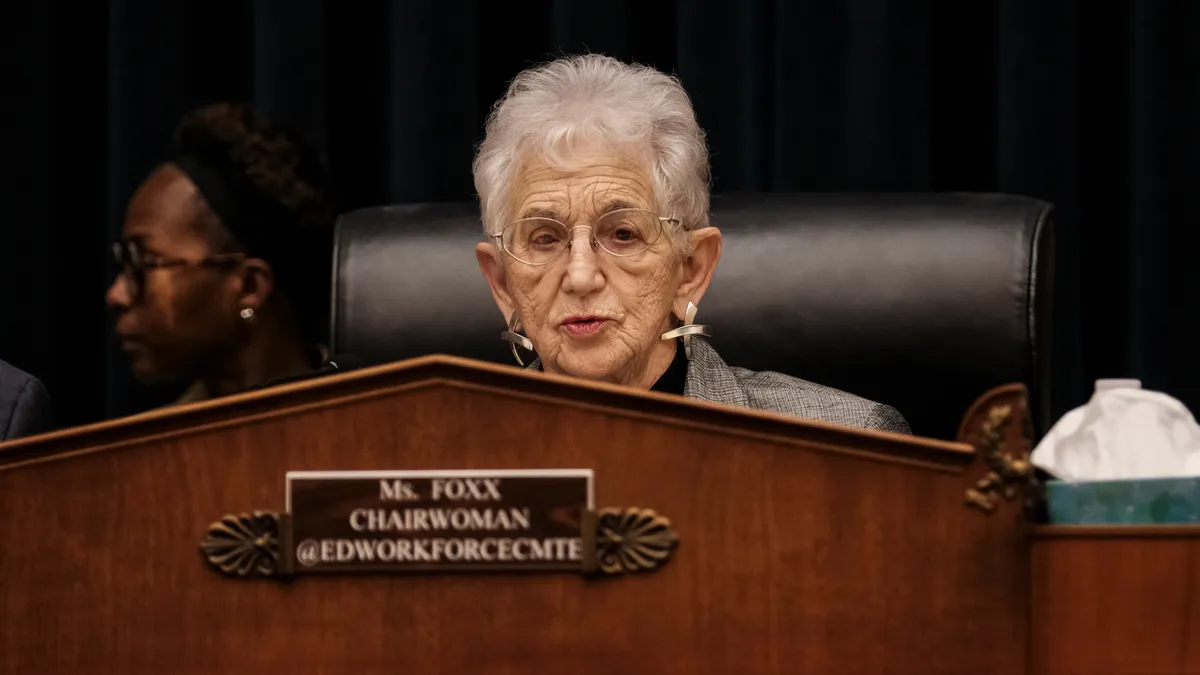Dive Brief:
- The House passed a bill Thursday that would limit restrictions public colleges could place on campus protests and bar accreditation agencies from requiring institutions to comply with diversity, equity and inclusion standards.
- Praising the End Woke Higher Education Act, Rep. Virginia Foxx, the North Carolina Republican who chairs the House’s education committee, said in a statement that it would safeguard student free speech “from the accreditation process down to the classroom.”
- However, the bill has drawn criticism from the higher education sector. The American Council on Education and five other higher ed associations argued in a Tuesday letter that the legislation would establish “rigid, highly prescriptive” mandates that would impose high costs on public colleges and undermine the bill’s own goals.
Dive Insight:
The Republican-led bill cleared the House, 213-201, largely along party lines. It faces an uphill battle of passing the Senate, where Democrats hold a slim majority.
Higher ed groups took aim at several provisions of the bill, which would require colleges to adopt new free speech policies to access Title IV federal financial aid.
For instance, the bill would require public colleges to provide students with a written statement during orientation explaining their free speech rights. It would also limit the restrictions public colleges could place on protests in “generally accessible” areas on their campuses.
Under the measure, public colleges couldn’t maintain “time, place or manner” restrictions on demonstrations in these areas unless they met certain criteria, such as being narrowly tailored, based on viewpoint-neutral criteria and leaving alternative channels for individuals to voice their opinions.
The legislation comes at a time when many colleges are tightening their protest rules following campus unrest in the spring over the Israel-Hamas war. For instance, some colleges have implemented rules aimed at deterring protest encampments.
In the Tuesday letter to House leadership, ACE President Ted Mitchell said the groups were “mystified” by provisions that would make it harder for campuses to provide discrimination-free environments and prevent antisemitism.
The bill would also mandate that public institutions establish “objective, content- and viewpoint-neutral” standards for determining how much funding student organizations receive.
Mitchell pointed to this requirement as one example of what he described as “difficult and costly mandates,” arguing that student organizations are “extraordinarily varied.”
“This could create a regulatory quagmire,” he wrote.
The higher education groups also took issue with the proposed penalties.
Colleges that fail to comply with certain requirements could lose their Title IV funding for an entire academic year — a decidedly heavy financial blow.
“Penalizing students with a loss of financial aid does nothing to further the goals of this legislation and is disproportional to the underlying violation,” Mitchell wrote.
The bill would also create an avenue for students and college employees to sue public institutions for damages over violations.
“Adding this new cause of action on top of existing legal remedies is unnecessary, duplicative, and would harmfully drain institutional resources away from efforts to protect students and campus free speech,” ACE wrote.
During congressional debate Thursday, Foxx called it “absolutely astounding” that higher education associations were opposing the measure. “That should send a message to the American people about what the status of higher education is right now,” she said.
Foxx also voiced support for portions of the bill that would block accreditors from imposing DEI standards on colleges as a condition of accreditation.
“Accreditation bodies and universities have increasingly promoted DEI initiatives that risk undermining intellectual diversity and free expression,” Foxx said.
Some accreditors have flagged concerns with DEI efforts at the colleges they monitor, according to The Chronicle of Higher Education.
For instance, California Lutheran University received a “notice of concern” from its accreditor in 2021 in part over its Black student outcomes and an allegedly unwelcoming environment for faculty of color, the publication reported. The review into the college ended last year.
However, not all accreditors have adopted DEI standards.
Although the Southern Association of Colleges and Schools Commission on Colleges, a major accreditor, was poised late last year to create a new DEI standard, delegates didn’t end up taking up the matter, The Chronicle reported.














